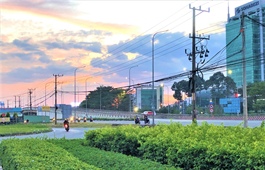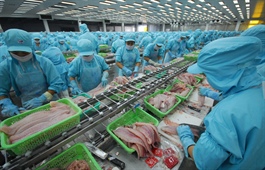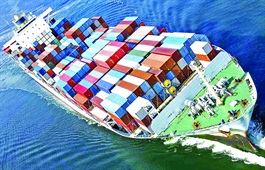Businesses must adapt to 'new normal' and take advantage where they can
Businesses must adapt to 'new normal' and take advantage where they can
The fourth wave of COVID-19 has affected all aspects of socio-economic life, including production and business. In response to the relaxing of pandemic restrictions, enterprises are being encouraged to take advantage of the unique opportunities that are now on offer.

The pandemic situation in HCM City and the surrounding areas has improved, presenting businesses with a window to restart operations. Support packages are being made available to help businesses kickstart operations, Vu Tien Loc, Chairman of the Vietnam International Arbitration Centre (VIAC), told Viet Nam News.
Loc predicted that orders would increase in the run-up to the spring and summer of next year, offsetting contracts from international brands that had been lost during the most recent wave of COVID-19.
Demand in the domestic market would grow steadily as consumption rises with the relaxing of restrictions, he said. Loc forecast that Viet Nam's economy would grow again in the first quarter of 2022, thanks to the combined efforts of the Government and business community.
Loc is petitioning the Government to accelerate support for businesses, as this is the fastest way to ensure economic recovery.
"Top priority should be given to simplifying administrative procedures to create the most favourable conditions for businesses in the next two years, facilitating their access to current monetary support packages and developing new incentive policies to support firms," Loc said, adding that tax reduction should be also included.
The State should help enterprises improve their competitiveness via training courses. Virtual trade promotion programmes would help firms reconnect to their export markets, he said.
Adaptability is key
Local businesses must adapt to the operational reality of the new normal, Loc said. Although the COVID-19 threat would soon end, other challenges, such as climate change and trade wars, would come over the horizon. Businesses must be ready to meet these challenges.
"The firms should take the initiative in sharpening their competitiveness with a focus on digitalisation, enhancing their corporations and risk governance capacities to survive all storms," Loc told Viet Nam News.
Sharing Loc's opinion, Le Xuan Nghia, Director of the Business Development Research Institute under the Ha Noi Association of Industry and Trade, said that as Viet Nam starts to reopen the economy, businesses should plan to recover quickly, seeking new markets and recruiting more labourers.
During an online conference held in Ha Noi, Pham Dinh Doan, Chairman of Phu Thai Group, who specialise in trade and consumer product distribution, suggested local businesses implement restructure and review initiatives, to ensure their effectiveness and open new avenues of revenue.
They should also improve their knowledge of mergers and acquisitions.
While waiting for State bailouts, businesses needed to actively negotiate with banks, financial institutions, customers and employees, to temporarily maintain cash flow, he added.
Sao Ta Foods Joint Stock Company, which operates in frozen shrimp manufacturing and exporting in the southern province of Soc Trang, said key markets for Vietnamese shrimp products were on a route to recovery thanks to widespread vaccinations and the implementation of post-COVID-19 support packages.
These countries had also gradually reopened their catering and tourism sectors while other large shrimp suppliers, such as India and Indonesia, had been severely affected by COVID-19, leaving a gap in the market that Viet Nam can fill.
"Vietnamese exporters have a lot of room to expand shrimp exports if they know how to take advantage of opportunities," the company said in an article published on its website.
According to Sao Ta, COVID-19 has changed consumption habits, making convenient foods and small packaged products more popular. As countries gradually emerge at different rates from the pandemic, Sao Ta plans to develop the two areas further.
The company will continue to expand its standard farming areas according to regulations, to offer more products that meet the traceability requirements of export markets, especially those in the EU.
It also plans to improve processing capacity and foster the appliance of 4.0 technology, to combat the labour shortages caused by migrant workers returning to their hometowns.
"Taking advantage of business opportunities is always a long-term solution of Sao Ta. To do so, Sao Ta is working hard to explore these opportunities while ensuring constant self-improvement," the company said.
In order to better facilitate the business community, the National Assembly (NA) has decided to waive many of the fees and taxes for businesses and people affected by the pandemic for the remainder of the year.
Under the latest resolution signed off by the NA Chairman Vuong Dinh Hue, taxpayers with revenue of less than VND200 billion (US$8.8 million) in 2021, and lower than their figure recorded in 2019, will be subject to a 30 per cent cut in corporate income tax.
The NA also agreed to exempt personal income tax, value-added tax, and other expenses payable by business households and individuals in districts affected by the pandemic during the third and fourth quarters of 2021.
The Government's Resolution No 128 provides temporary guidance on the "Safe adaptation, flexibility and effective control of the COVID-19 pandemic". The Resolution is considered an important step towards Viet Nam adapting to the so-called new-normal situation. The resolution has been welcomed by the business community.
The guidelines set out three criteria to assess the level of pandemic risk, including the number of new infections in the community, the coverage of vaccinations and the ability to receive and treat patients, so that pandemic control and other socio-economic actitivies can be conducted from a uniform approach.
The guidelines stipulate four levels of pandemic risk, which are as follows: Level 1: low-risk (new normal) – labelled green; Level 2: medium-risk – labelled yellow; Level 3: high-risk – labelled orange; and Level 4: very high-risk – labelled red.
Production and business establishments, enterprises, cooperatives, households businesses, traffic works, construction, business and service establishments are all allowed to operate at all four levels, but owners must have plans and take responsibility for pandemic prevention and control.
























